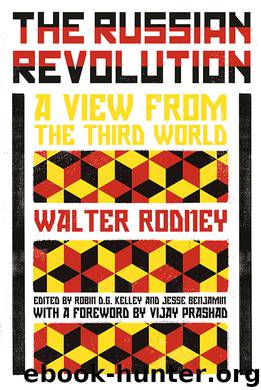The Russian Revolution by Walter Rodney

Author:Walter Rodney
Language: eng
Format: epub
Publisher: Verso Books
So said Pobedonostsev.17 At least he was loyal to the tsar and he was relatively sane, which cannot be said for some others. Baron Boris Stürmer, one of the ministers, was very suspiciously connected with the Germans, while another powerful minister, Protopopov was subject to fits of lunacy, apparently the consequence of advanced syphilis.18
Given the influence of Rasputin and the odd collection of ministers, it may seem that a writer like Karpovich has a very strong point when he says, “The war made the revolution highly probable, but human folly made it inevitable.”19 In other words, Karpovich is saying that when tested by war, Russian society showed weakness at the government level. The human folly of the tsar and his ministers made a difficult situation impossible and led to revolution. Such an argument dismisses the long-term causes working during the “old regime” and gives us an apparently satisfactory reason for the revolution by concentrating on the period of the eve of the revolution.
A question that these émigrés do not ask is, why was it possible for a government of a huge country to fall into the hands of such utter reactionaries, charlatans and fools? Soviet historians, and Trotsky in particular, suggest that the stupidity of the government was itself the reflection of the irreconcilable contradictions in the society, which had upset the formerly secure feudal base. The rise of new classes was fast making the aristocracy irrelevant. To keep themselves in power, they made the state machinery more blind, more repressive and more out of touch with all enlightened opinion. It was only in an autocratic regime lacking in vitality that such a collection of idiots could govern. The “human folly” was thus a product or symptom of a very sick society indeed.
Some Western historians, without using a Marxian analysis, arrive at a conclusion very similar to that of the Soviet historians. Apart from E. H. Carr, this is true of B. H. Sumner, a British historian who is no friend of the Bolsheviks, but who, using his own terminology, in effect acknowledges that the feudal base of tsarist society had been eroded, and that this was the reason for the absurd behavior of the court: “It has already been said that tsarism had operated through the landowning class, the army and the police, the bureaucracy and the Church. By the time of the war the last was but a hollow prop, the first was as such a spent force.”20 In other words, the revolution in February 1917 was made possible because of the long-term forces that had been operating within feudalism to deprive the landowning church and nobility of their socioeconomic strength. This takes us full circle, back to the Marxist and Soviet argument that changes in the mode of production determined that there should be the birth of a new society, and that revolution was the midwife that brought the new society into being.
Download
This site does not store any files on its server. We only index and link to content provided by other sites. Please contact the content providers to delete copyright contents if any and email us, we'll remove relevant links or contents immediately.
| Anthropology | Archaeology |
| Philosophy | Politics & Government |
| Social Sciences | Sociology |
| Women's Studies |
The Secret History by Donna Tartt(19007)
The Social Justice Warrior Handbook by Lisa De Pasquale(12178)
Thirteen Reasons Why by Jay Asher(8875)
This Is How You Lose Her by Junot Diaz(6862)
Weapons of Math Destruction by Cathy O'Neil(6252)
Zero to One by Peter Thiel(5772)
Beartown by Fredrik Backman(5719)
The Myth of the Strong Leader by Archie Brown(5484)
The Fire Next Time by James Baldwin(5417)
How Democracies Die by Steven Levitsky & Daniel Ziblatt(5201)
Promise Me, Dad by Joe Biden(5132)
Stone's Rules by Roger Stone(5068)
A Higher Loyalty: Truth, Lies, and Leadership by James Comey(4942)
100 Deadly Skills by Clint Emerson(4901)
Rise and Kill First by Ronen Bergman(4765)
Secrecy World by Jake Bernstein(4732)
The David Icke Guide to the Global Conspiracy (and how to end it) by David Icke(4687)
The Farm by Tom Rob Smith(4490)
The Doomsday Machine by Daniel Ellsberg(4476)
